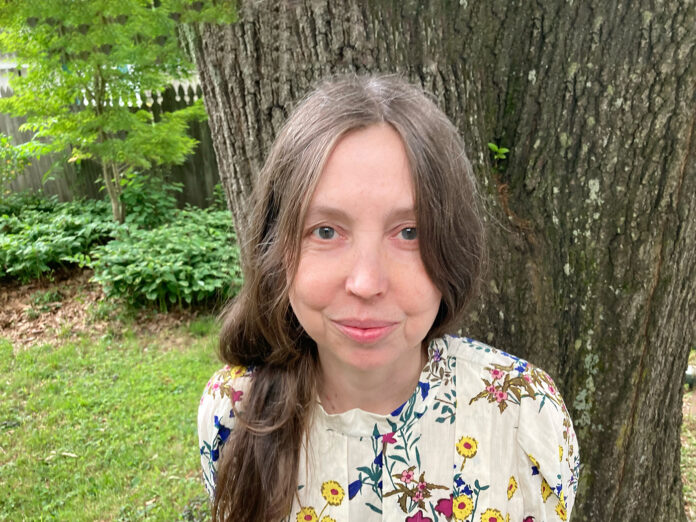Parenthood is a teacher, people say, and one of the key things American singer-songwriter Connie Lovatt learned from becoming a mother was patience. “The amount of patience you need when caring for a newborn or a baby or a toddler will toss out any previous claim to being well versed in the concept,” she reflects when asked about the ways the mother-daughter dynamic affected her relationship to music. “I was, thankfully, forced to apply that to the songwriting,” she continues. “Getting frustrated with how little I could work, or with how frequently I could return to the work, was pointless. I worked when I could, and I finished when I could, and it took what it took.”
Parenthood is a teacher, people say, and one of the key things American singer-songwriter Connie Lovatt learned from becoming a mother was patience. “The amount of patience you need when caring for a newborn or a baby or a toddler will toss out any previous claim to being well versed in the concept,” she reflects when asked about the ways the mother-daughter dynamic affected her relationship to music. “I was, thankfully, forced to apply that to the songwriting,” she continues. “Getting frustrated with how little I could work, or with how frequently I could return to the work, was pointless. I worked when I could, and I finished when I could, and it took what it took.”
ORDER NOW: Bob Dylan and the Review Of 2023 star the latest UNCUT
Not to overwork a connecting thought, but patience is something a fan of Lovatt’s music has had to learn, too. She first appeared on folks’ radars in the early to mid 1990s, as a member of Containe, a duo with Fontaine Toups of New York indie rockers Versus. She was part of that group’s wider circle of peers and colleagues, including Peer Hansen and Jason Asnes, with whom she released a single as Alkaline; Asnes was also a member of the pre-Versus outfit Saturnine. Later, she formed The Pacific Ocean with Ed Baluyut of Versus. She also fell in with Bill Callahan, touring with Smog and appearing on his career-defining album, 2002’s A River Ain’t Too Much to Love.
That was, more or less, the last many of us heard from Lovatt until now. A quiet presence in independent music, Lovatt seemed to work well collaboratively, and the music she made with Containe and The Pacific Ocean shared an understated poetics; twisting smartly through unexpected chord changes and high-flying melodies, the surface emotional ambivalence of Lovatt’s early writing, particularly on the two Containe albums, I Want It All and Only Cowards Walk Like Cowards, belies hidden depths. It seemed to pick up a few distinct threads from its preceding decade – the considered folksiness of groups like Salem 66; the chiming lilt of Galaxie 500 or Beat Happening – and weave them into new, unexpected shapes.
Coconut Mirror is Lovatt’s first solo album and the cast on this diminutive but emotionally rich collection of songs is impressive – Callahan appears on “Kid”; Jim White of Dirty Three, and James McNew of Yo La Tengo, make for an impressive rhythm section; Che Chen of 75 Dollar Bill turns up on lead guitar on a few tracks; Rebecca Cole, of Wild Flag and touring member of Pavement, is here too. The album came together during the pandemic, so these various musicians sent through their parts, via the post or file exchange. For Lovatt, this was an experience rich with possibility: “Recording the demo was setting a pleasing table for one. Re-singing the songs after everyone’s parts had been woven in was like arriving at an excellent party, well underway, where every detail was taken care of.”
Perhaps the most significant guest on the album, though, is one Hartley Nandan, screaming on the penultimate “Sleep”. Significant as this is Lovatt’s daughter, who the album was written for; it’s a form of storytelling, from Lovatt to Nandan, that fundamentally affected the album’s songs: as Lovatt says, “Once I realised that I was writing this record for [my daughter] it became a lot easier to shape the purpose of each song and creative narratives.” This explains, in some ways, both the openness of the songs – Lovatt’s singing has never been this tender before, her melodies breathing more naturally, the songs brief yet decisive in their expression. “Kid” seems to capture the many emotional resonances of the early years of raising a child, with Callahan joining towards the end, singing into silence, one beautiful line, “shed a tear for God”.
Lovatt is particularly adept at clipping the unexpectedly profound from the papers of everyday living and framing these moments as abstract keepsakes, hinting at the complexity of memory, but expressed in smartly compact songs that work allegory and experience into miniature stories. “Heart” has a Mekons-esque clip to it; “Basin” pirouettes through unpredictable chords, small shifts in moods, whistling as Lovatt sings of domesticity; “Lines” has a gorgeous melodic arc across the entire song, which is shadowed by excellent, smartly fluent guitar from Chen. Indeed, the musicianship throughout is exquisite, but ultimately, everything’s in service to the jewel-like qualities of Lovatt’s 11 songs, each one a rare gemstone, refracting through prisms, conducting light in birefringence.



